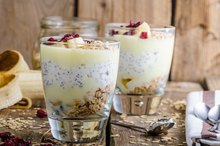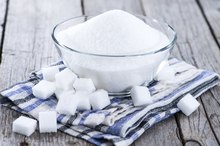What does fact checked mean?
At Healthfully, we strive to deliver objective content that is accurate and up-to-date. Our team periodically reviews articles in order to ensure content quality. The sources cited below consist of evidence from peer-reviewed journals, prominent medical organizations, academic associations, and government data.
- "Nutrition & Metabolism"; Increased Ratio of Dietary Carbohydrate to Protein Shifts the Focus of Metabolic Signaling From Skeletal Muscle to Adipose; S. Devkota, D.K. Layman; March 2011
- "Nutrition & Metabolism"; Increased Ratio of Dietary Carbohydrate to Protein Shifts the Focus of Metabolic Signaling From Skeletal Muscle to Adipose; S. Devkota, D.K. Layman; March 2011
The information contained on this site is for informational purposes only, and should not be used as a substitute for the advice of a professional health care provider. Please check with the appropriate physician regarding health questions and concerns. Although we strive to deliver accurate and up-to-date information, no guarantee to that effect is made.
Nutritional Content of Italian Ricotta Cheesecake
Italian ricotta cheesecake is a decadent dessert that derives its rich flavor from the high-fat cheese it contains. This type of cake isn't ideal for dieting, as the high fat content brings with it a high calorie count. While ricotta cheese provides some nutritional benefits, the other ingredients, including sugar, combine to make this a relatively unhealthy dish.
Calories
Italian ricotta cheesecake, as with most desserts, is calorie dense, meaning even small servings have a lot of calories 1. An 85 g slice of the cake contains 200 calories, which composes 10 percent of the total daily suggested intake of 2,000. This makes Italian ricotta cheesecake more calorie dense than many other foods; an 85 g serving of yogurt contains just 48 calories, for example 1.
Fat
Nutritional Value for Brownies
Learn More
The reason Italian ricotta cheesecake is calorie dense is its high fat content 1. Each 85 g slice contains 8 g fat. Of that fat, 4 g comes from saturated fat, a type of fat that may increase your risk of heart disease if you consume it in excess. The American Heart Association recommends consuming less than 16 g saturated fat each day.
- The reason Italian ricotta cheesecake is calorie dense is its high fat content 1.
Carbohydrates
Italian ricotta cheesecake is also rich in carbohydrates 1. An 85 g serving contains 23 g carbohydrates. Carbohydrates are your body's primary source of energy, but some research suggests high-carbohydrate diets may not be optimal for body composition. A study published in the March 2011 issue of "Nutrition & Metabolism" indicates that diets with a high ratio of carbohydrates to protein encourage increased cellular signaling for fat storage and decreased signaling for muscle gain 2.
Sugar
Nutritional Facts for Oatcakes
Learn More
Most of the carbohydrates in Italian ricotta cheesecake come from sugar 1. Each 85 g slice contains 17 g sugar. Sugar is a type of carbohydrate that is absorbed rapidly by your body, so it causes a sudden swing in your blood sugar levels. This can lead to what is known as a "sugar crash," or feelings of fatigue after an initial increase in energy. Sugar can also promote tooth decay, and research from the April 2010 issue of "The Journal of the American Medical Association" suggests high-sugar diets can encourage high levels of LDL, or bad, cholesterol and low levels of HDL, or good, cholesterol.
- Most of the carbohydrates in Italian ricotta cheesecake come from sugar 1.
- Sugar can also promote tooth decay, and research from the April 2010 issue of "The Journal of the American Medical Association" suggests high-sugar diets can encourage high levels of LDL, or bad, cholesterol and low levels of HDL, or good, cholesterol.
Protein
Because Italian ricotta cheesecake contains dairy, it does provide more protein than other desserts. An 85 g slice contains 7 g of protein, which is 1 g more than an egg provides. Eggs contain 130 fewer calories, though, so they are the preferable protein source.
Related Articles
References
Writer Bio
Brian Willett began writing in 2005. He has been published in the "Buffalo News," the "Daytona Times" and "Natural Muscle Magazine." Willett also writes for Bloginity.com and Bodybuilding.com. He is an American Council on Exercise-certified personal trainer and earned a Bachelor of Arts in journalism from the University of North Carolina.








